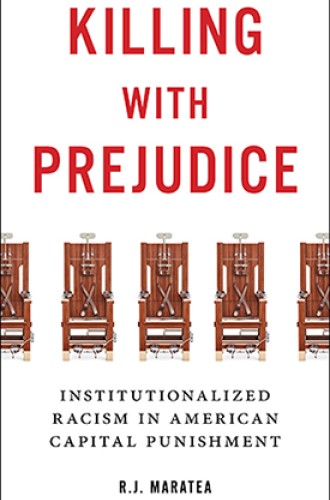Tracing the racist history of the death penalty in Georgia
R.J. Maratea argues that lynching declined when white people began to realize that the courtroom would work just as well.
Of the nearly 1,500 executions in the United States since 1976, over 70 percent have occurred in the 11 southern states of the former Confederacy. Sociologist R. J. Maratea posits a direct line of racialist social control in these states extending from slavery to the modern criminal justice system.
Maratea focuses on the case of Warren McCleskey, who was executed by Georgia in 1991 for killing a white police officer during an armed robbery. McCleskey’s crime “hit squarely in the face of expected racial etiquette in the Deep South and singled out Warren McCleskey as a black man in need of killing.”
To support this claim, Maratea surveys Georgia’s history, observing that prior to the Civil War, Georgia’s criminal statutes expressly subjected black men to death for a wider array of crimes than white men. For years after the Civil War, mobs of white men lynched black men for violating unwritten racial codes.
State and local government officials often looked the other way, and the federal government’s response to lynching was repeatedly stymied with filibusters by southern senators. Nevertheless, Maratea argues, incidents of lynching declined in the 1920s and 1930s when southerners began to realize that “mob violence could be enveloped into the existing justice system and effectively accomplished inside the courtroom under the guise of law.”
In 1972, however, the United States Supreme Court ruled in Furman v. Georgia that the Georgia law authorizing the death penalty was unconstitutional, effectively installing a nationwide moratorium on all death sentences. The five justices in the majority were divided over whether the death penalty was unconstitutional in all circumstances or whether adopting procedural safeguards could lead to a nondiscriminatory application of it. Just four years later, in Gregg v. Georgia, a different majority upheld Georgia’s reformed death penalty statute and, in doing so, articulated standards that permitted the constitutional application of the death penalty. The Gregg ruling required two conditions: first, a bifurcated trial, so that the jury that weighs a defendant’s guilt or innocence is not the same jury that decides whether a convicted defendant should be condemned to death; and second, a list of legislatively enacted “aggravating factors” to limit the scope of cases for which death is a potential penalty.
This framework was in place when McCleskey received his death sentence. On appeal, McCleskey’s attorneys claimed that his conviction and death sentence were the result of racial biases. They pointed to statistical evidence showing that prosecutors in Georgia were more likely to seek a death sentence, and sentencing juries more likely to grant one, when the victim of a homicide was white than when the victim was black. This “race of victim” effect was multiplied by a secondary “race of offender” effect, showing that black defendants were more likely to be sentenced to death than white defendants.
The Supreme Court rejected McCleskey’s appeal in a 5–4 decision, holding in McCleskey v. Kemp (1987) that statistics showing disproportionate racial impact were not sufficient to render application of the death penalty unconstitutional in any particular case.
Writing for the majority of the Court, Justice Lewis Powell explained that McCleskey’s lawyers would need to point to a particular aspect of his case that showed conscious, deliberate bias by state law enforcement officials. By requiring this direct evidence, Maratea writes, Powell acknowledged “that some racial prejudice in death penalty cases is acceptable.”
Maratea’s analysis of McCleskey, written for an audience familiar with criminal law, is structured a bit unevenly. His focus on Georgia minimizes both the nationwide application of McCleskey and the national scope of racially unequal structures, although he acknowledges both in his conclusion.
Nevertheless, Maratea’s work is particularly valuable in juxtaposing examples of Powell’s own jurisprudence. Fourteen years before McCleskey, Powell established a doctrine in McDonnell Douglas Corp. v. Green that permitted plaintiffs alleging employment discrimination to prove an inference of discrimination by pointing to statistics showing a disparate racial treatment, even if there was no direct evidence of racism. The McDonnell Douglas doctrine was reaffirmed just a year before McCleskey.
One clue to understanding the disconnect between McDonnell Douglas and McCleskey appears in Powell’s opinion:
McCleskey’s claim, taken to its logical conclusion, throws into serious question the principles that underlie our entire criminal justice system. . . . If we accepted McCleskey’s claim that racial bias has impermissibly tainted the criminal sentencing decision, we could soon be faced with similar claims as to other types of penalty.
The Court was not prepared to open those floodgates.
The lesson of McCleskey is that courts are not the ideal venue in which to initiate lasting social change. It is relatively easy for a court to remedy a claim that one employer violated the 1964 Civil Rights Act’s guarantee of equal employment rights; a court is much less equipped to dismantle structural inequalities in the justice system.
The Supreme Court’s experience with the death penalty is illustrative in this respect. Shortly before the Court issued Furman, more people opposed the death penalty than supported it. After Furman, support for the death penalty spiked, even as violent crime was falling. Scholars, including Maratea, point to Furman as the inflection point for this backlash.
In his last statement before his execution, McCleskey pled for the United States, “supposedly a civilized society,” to “abolish barbaric acts such as the death penalty.” McCleskey’s plea is not ultimately one for the courts; it is one for everyone who engages in our country’s civic conversation.




